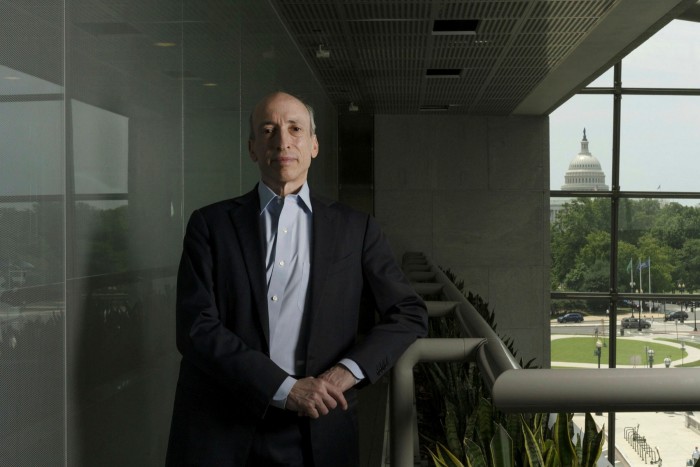Borderless crypto markets show need for global rules

Simply sign up to the Financial & markets regulation myFT Digest -- delivered directly to your inbox.
More than 500 years elapsed between the founding of the world’s first bank, Monte dei Paschi di Siena, and the creation of the first set of global banking standards: the 1988 Basel accord.
By that benchmark, global policymakers are ahead of the curve in devising standards for cryptocurrencies, which emerged just 13 years ago with Bitcoin’s January 2009 debut. Forums such as the Basel Committee of Banking Supervision, the Financial Stability Board, and the securities regulator Iosco are already discussing global standards for crypto.
But this year has brought new urgency to those talks, as crypto markets’ explosive growth, coupled with their increasing links to the regulated sector and the currencies’ widespread adoption by individuals, have prompted the FSB to warn that stability risks could “escalate rapidly”.
“Anything that is growing and not regulated can cause enormous problems if we don’t get to grips with it,” warned Mairead McGuinness, the EU’s commissioner for financial services, at an FT event on February 17. She described how young people are now investing in crypto as a “pastime” and taking financial advice from the video sharing platform TikTok.
“The collective activities are alarming if they’re not regulated, and this is why there is a global need for principles around the whole crypto space,” she stressed.
The borderless nature of cryptocurrency trading companies, whose decentralised businesses can be scattered across physical territories and servers, further underscores the need for a global approach to policing them.
“There are cryptocurrency businesses that appear to be everywhere and yet physically are nowhere at all,” said Mark Steward, head of enforcement and markets oversight at the UK’s Financial Conduct Authority, at the same February 17 event. “That’s a real red flag for everyone and it’s something that should concern regulators all over the world.”
Halfway around the world from the FCA, Ashley Alder — head of Hong Kong’s Securities & Futures Commission and chair of global securities regulator, Iosco — sees co-ordination between the various domestic and international regulators as “of paramount importance”. He says he wants to “explore a holistic and integrated approach to virtual asset activities, and to reduce regulatory arbitrage”, ie any variation in rules between territories.
However, while policymakers in major financial centres agree on the need for global standards, Benoît Coeuré, the then head of the Bank for International Settlements innovation hub, warned in December of the risk that jurisdictions pursue “different tracks and produce a system which is globally inconsistent”.
The EU has already set out its proposed regional principles in the Markets in Crypto Asset (Mica) directive. This was presented to the European parliament in October 2020 and is expected to come into force around 2024 — covering everything from the custody of digital assets to sales and trading of them, offering advice, and exchanging them for hard currency.
Meanwhile, in Hong Kong, Alder says his agency has been “pragmatically and creatively applying its existing powers” so that it can regulate crypto as it would regulate other securities. Or, as he puts it: “On the basis of a ‘same business, same risks, same rules’ approach.”
More formal rules are coming. Hong Kong is now developing legislation that will make sure that all crypto assets are captured by the same regulation “regardless of whether crypto assets traded on these platforms fall within the traditional definition of ‘securities’.”
Neighbouring China has taken a more absolute approach. In September, the authorities declared all crypto activities “illegal” and vowed to investigate Chinese nationals working for foreign crypto exchanges.
Singapore has instead brought crypto into its anti-money laundering regime. According to a spokesperson for the Monetary Authority of Singapore, regulators are “ready to adapt our rules as needed to manage the policy balance” between supporting innovation and managing risks.

In the US, Securities & Exchange Commission chair Gary Gensler has been pushing for Congress to give his agency — and others, such as the Commodity Futures Trading Commission — powers to deliver “more robust oversight and investor protection” in the large parts of the crypto market that are “sitting astride” the regulatory framework. He has warned that these are “rife with fraud, scams and abuse”.
The CFTC has also warned of the dangers of “regulating through enforcement” and called on Congress to frame clearer rules for what’s legal and what’s not.
In the UK, the FCA has begun registering cryptocurrency companies for compliance with anti-money laundering rules and has warned of a crackdown on advertisements once crypto comes into the FCA’s financial promotions regime. “Legislation is needed more broadly here,” Steward said at the recent FT event.
In addition to these national regulatory moves, all the major territories say they are mindful of global developments and participating in international discussions. One official points out that the EU’s Mica directive was designed to implement international recommendations where they existed, including the work that the FSB had done around stablecoins — a type of cryptocurrency whose value is backed by real assets, such as traditional currencies, gold or short term bonds.
Still, that does not mean differences in regulatory treatment will not creep in — even among regimes with a shared aim of protecting consumers and maintaining financial stability. For this reason, crypto regulation has now shot up the agenda of the FSB.
Klaas Knot, the FSB’s chair, says: “The FSB would be naturally positioned to take that lead. We have the convening power . . . we bring together the central banks, the finance ministries, which represent the ultimate legislators, the supervisory agencies, both banking, insurance, securities and some international organisations. They’re all at the FSB table.”
Knot expects that the FSB’s work on global crypto standards could progress “quite a bit in 2022”. The next step would be publishing those standards and having them swiftly implemented by the 24 member countries of the FSB — and others beyond.
Everyone is hoping that swift action can ensure crypto’s fate is less ignominious than that of Monte dei Paschi: once famous as the world’s oldest bank, now best known as the institution brought closest to collapse by the eurozone’s financial crisis.
Weekly newsletter
For the latest news and views on fintech from the FT’s network of correspondents around the world, sign up to our weekly newsletter #fintechFT
Letters in response to this article:
Let’s hope the US follows Europe’s crypto lead / From Susan Friedman, Head of Public Policy, Ripple, London EC2, UK
Let the crypto platform providers set best practice / From David E Rutter, Founder and Chief Executive, R3 Former Chief Executive, ICAP, London EC2, UK

Comments